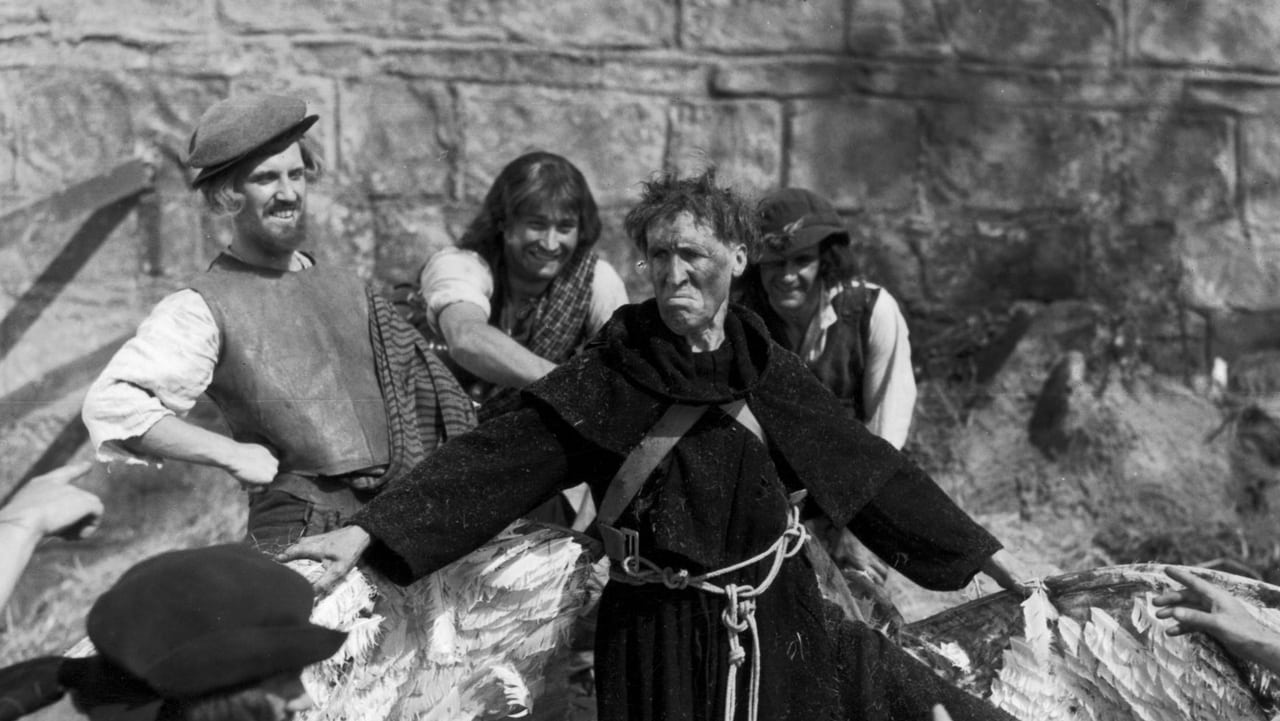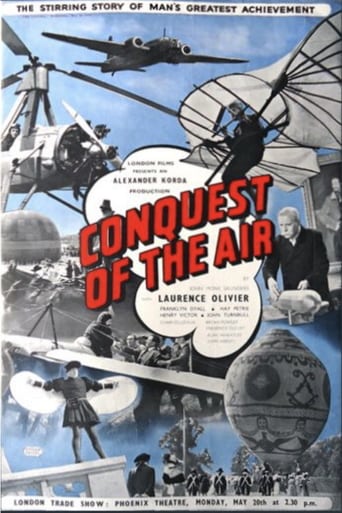

This is a decent British made (but very biased) film probably an 8 or 9 for an aviation enthusiast from Europe. I'm giving it a 6 although I could have rated it less. I watched it on Turner Classic Movies (USA version) because it was described as a comedy drama featuring Laurence Olivier so that sounded interesting to me. Thinking it was a feature film I was surprised that it was actually a second feature documentary. Laurence Olivier plays one balloonist from the 18th century so with a total time of around 70 minutes and dozens of aviators featured his screen time is about 1 minute long and he plays an Italian! That is probably the highlight of the film actually. It gets pretty boring and actually disappointing when they get to the climatic Wright Brothers who have no actors playing them with lines and their screen time is about 30 seconds. The reenactment did look nice though. Much more time is given to the English Channel crossing (go figure). Then after WWI they skip the round the world flight by the US Army in 1924 and instead talk about a bunch of, you guessed it, European and British Commonwealth aviators. A very very brief mention is given to Lindberg, Earhart, and Wiley Post, probably because they were just too big at the time to be ignored. It finishes with what seems to be a lot of filler material about sea planes which could have easily been shortened, before getting back on track and showing some innovative new planes. It's possible that this was a big infomercial FOR the Imperial Airways Flying Boat business! 6 of 10 may be too generous but the footage of early helicopters and other pioneering planes (auto-car!) and the reenactments will make an aviation buff glad they watched. One thing I figured out in reflection shortly after I finished this is that the British were nurturing ties with the Italians showing a lot of their participation in the air races of the 20's and 30's and definitely could care less about the Americans who had Doolittle (of Raid On Tokyo fame) win the Snyder Cup for 3 years but is never mentioned. I cannot imagine a non aviation buff viewer of 2014 finishing this film. Also, the version I watched had Churchill in it so I probably watched a re-release version and not the one from 1936 unless they were being very prophetic because Churchill was in politics then but not the Prime Minister.
... View MoreSome of the other reviewers answered certain questions I had about this film. Certainly what I saw today was not the original production of Conquest Of The Air. What apparently this film tried to be was the first docudrama ever done. If someone can recall an earlier one I'll stand corrected. That additional newsreel footage of Winston Churchill who was probably First Lord of the Admiralty when it was shot indicates a second World War had begun which promised and delivered to be more terrible than the last.Taking the story of man's fascination of flying back to ancient mythological days, Conquest Of The Air shows a patient building block like achievement of man trying to get off the ground and travel like the birds. For earlier times they're recreated with players and sets the most prominent being Laurence Olivier. As an educational film Conquest Of The Air is informative, but as entertainment it falls far short of the mark.
... View MoreTo clarify some questions raised by other user comments, I quote from the liner notes to a CD collection called "Classic British Film Music," which includes a suite from the score Arthur Bliss composed for the original version of the film: "CONQUEST OF THE AIR was planned as an epic chronicle of mankind's romance with flight from the early legend of Icarus to speedy aerial circumnavigations of the modern age. This history was to be retold as a series of lavishly mounted tableaux vivants featuring, among others, Hay Petrie as a corpulent Tiberius Caesar ... and Laurence Olivier in fine voice as the grandiloquent balloonist Vincent Lunardi. However the film was not immediately released--appearing belatedly in 1940 in a much truncated form--running for only seventy-one minutes—and with many of its original sequences either missing or drastically curtailed—but with additional scenes added impress the extent of Britain's growing military airpower. During the wholesale dismantling of the original footage, no account was taken of Bliss's music, which was copped up along with the film stock" .... (Liner notes by David Wishart) So keep in mind when viewing the film as it now survives that this is a very poor "remix" of something we will almost certainly never see, and that might have been very fine.
... View MoreNOTE: While the release date on IMDb says it's 1936, there is a problem with this date. The film version I saw went up to 1938. Perhaps more material was added and I watched a re-release. Or, what's more likely is that the 1936 date is an error."Conquest of the Air" is a strange film in that there is a lot to admire and a lot to dislike. On the plus side, it's a nice and rather comprehensive review of the history of flight--with a strong emphasis on the botched attempts to fly from the middle ages up to about 1800. There also is a nice bit about ballooning and dirigibles. So, historically speaking, it's a nice educational overview. HOWEVER, while I admire the film in recreating so many nice tableaux, the narration is dreadfully boring and the film often comes off as an awful educational film--the sort they used to bore kids with in the good old days. Surely this could have been made in a more interesting fashion--this coming from a guy who LOVES airplanes and historical films. In addition, there were some curious omissions--such as the deaths of many of the famous people (such as Wilbur Wright during one of his flights). Worth seeing if you adore planes and balloons but not for the easily bored.By the way, I think if the film had featured less aviators and spent more time on the most important the overall film would have been more interesting and far less episodic.
... View More